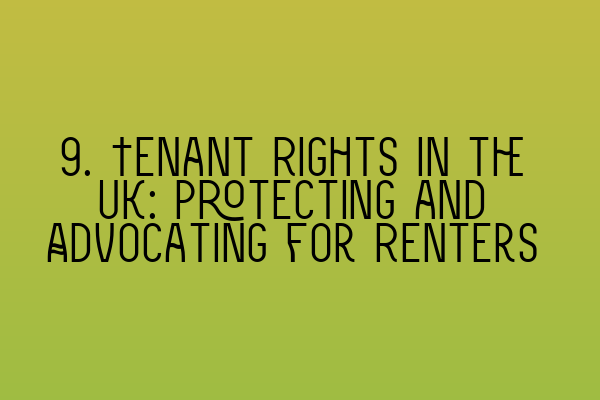Tenant Rights in the UK: Protecting and Advocating for Renters
As a tenant in the UK, understanding your rights is crucial to ensuring a fair and secure renting experience. Renters face various challenges and it’s important to know your legal rights and how to advocate for yourself. In this blog post, we will discuss nine essential tenant rights in the UK and provide guidance on how to protect and assert these rights.
1. Right to a Written Agreement
One of the first rights you have as a tenant is the right to a written tenancy agreement. This agreement should clearly outline the terms and conditions of your tenancy, including the duration of the tenancy, rent amount, and any additional responsibilities or restrictions. Having a written agreement helps protect both the tenant and the landlord and ensures that both parties are aware of their obligations.
To learn more about tenancy agreements and how to navigate them, check out our article on SQE 1 Practice Exam Questions.
2. Right to a Safe and Habitable Property
Every tenant in the UK has the right to live in a safe and habitable property. Your landlord is responsible for ensuring that the property meets certain health and safety standards. This includes providing adequate heating, water, and sanitation facilities, as well as maintaining the property’s overall condition. If you believe that your landlord is not meeting their obligations, you have the right to take action.
For more information on your rights regarding property standards, refer to our comprehensive guide on SQE 1 Practice Mocks FLK1 FLK2.
3. Right to Privacy
As a tenant, you have the right to enjoy privacy in your rented property. Your landlord should not enter your home without your permission, except in specific circumstances outlined in the tenancy agreement or as required by law. If you believe that your privacy rights are being violated, it is important to address the issue with your landlord and seek appropriate legal advice if necessary.
To learn more about your rights to privacy as a tenant, take a look at our comprehensive guide on SQE 2 Preparation Courses.
4. Right to Protection from Unfair Eviction
Under UK law, tenants are protected from unfair eviction. Your landlord must follow the correct eviction procedures and provide valid reasons for seeking possession of the property. In most cases, landlords need to obtain a court order to evict a tenant. If you believe you are being unfairly evicted, it is important to seek legal advice and understand your rights.
For a detailed overview of eviction procedures and how to protect yourself, check out our article on SQE 1 Preparation Courses.
5. Right to a Fair Rent
As a tenant, you have the right to a fair rent. This means that your landlord cannot charge an excessive rent or increase the rent without a valid reason. The rent should be in line with the current market rates for similar properties in the area. If you believe that your rent is unfair, you can challenge it by following the appropriate procedures.
To understand more about fair rent and how to navigate rent-related issues, explore our comprehensive guide on SRA SQE Exam Dates.
6. Right to Protection from Unlawful Discrimination
In the UK, it is illegal for landlords to discriminate against tenants based on their protected characteristics, such as age, disability, gender reassignment, marital status, race, religion, sex, or sexual orientation. If you believe that you have been unlawfully discriminated against, it is important to report the matter and seek legal advice.
For more information on discrimination protections for tenants, refer to our in-depth article on SQE 1 Practice Exam Questions.
7. Right to Challenge Unfair Charges
Your landlord can charge you for certain costs, such as repairs or maintenance. However, these charges must be reasonable and clearly outlined in the tenancy agreement. As a tenant, you have the right to challenge any unfair charges or withhold payment until the issue is resolved.
To learn more about your rights regarding charges and how to handle disputes, check out our guide on SQE 1 Practice Mocks FLK1 FLK2.
8. Right to Redress and Compensation
If your landlord has failed to meet their legal obligations or has treated you unfairly, you have the right to seek redress and possibly receive compensation. There are various avenues available for resolving disputes, including mediation, arbitration, and seeking legal action if necessary.
To understand more about your rights to redress and compensation as a tenant, refer to our comprehensive guide on SQE 2 Preparation Courses.
9. Right to Join a Tenants’ Association or Union
Joining a tenants’ association or union can provide you with valuable support and resources. These organizations can help you advocate for your rights, provide legal advice, and offer a platform for tenant voices to be heard. Consider joining a tenants’ association or union in your area to strengthen your position as a renter.
For more information on tenants’ associations and unions, check out our article on SRA SQE Exam Dates.
Conclusion
Understanding and asserting your tenant rights is essential for maintaining a fair and secure renting experience in the UK. As a tenant, you have the right to a written agreement, a safe and habitable property, privacy, protection from unfair eviction, a fair rent, protection from unlawful discrimination, the ability to challenge unfair charges, redress and compensation when needed, and the option to join a tenants’ association or union.
If you have any concerns or questions about your tenant rights, it is recommended to seek legal advice from a qualified solicitor specializing in property law. They can help you navigate complex legal issues and ensure that your rights are protected.
